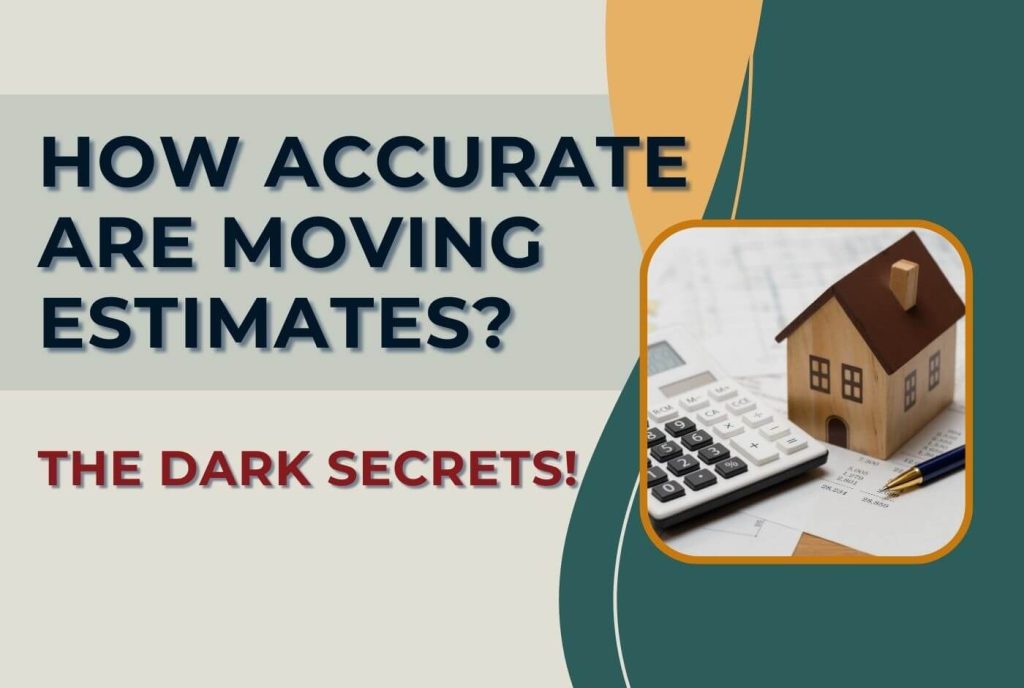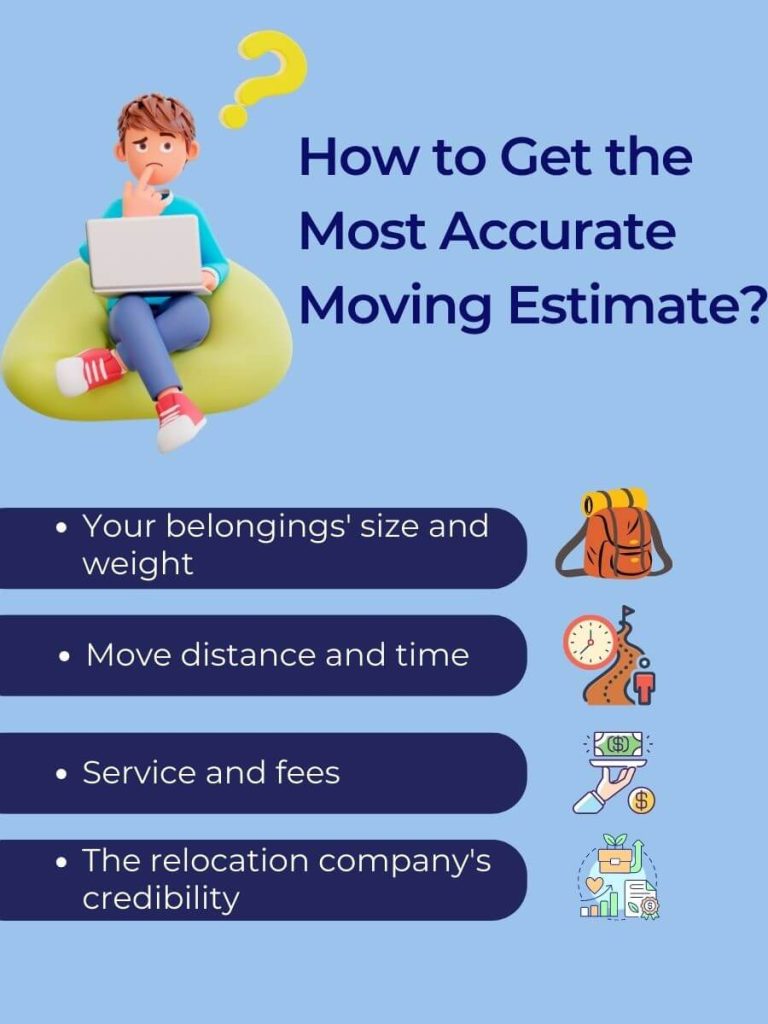Moving is a stressful experience, and getting an accurate moving estimate is one of the most stressful parts. After all, you don’t want to be surprised by a massive bill at the end of your move.

So, how accurate are moving estimates? The truth is it depends on several factors.
Factors that can affect the accuracy of a moving estimate
We had a talk with Hannah, a recent mover, she had to move with her family from New York to Florida. She received three different moving estimates, and we’ll break down how each estimate was affected by factors like distance, belongings, and moving season.
20- to 24-year-olds are most likely to move annually. So it needs to be an accurate estimate.
Move Distance
Moving farther costs more. Moving requires extra time, fuel, and resources. Distance influences delivery time, delays, and damages. Ask your movers not to exceed estimates.
Moved Objects
More stuff means more room and weight in the moving truck. This requires a larger truck or more journeys, which increases moving costs and time.
Decluttering, giving, and selling unwanted goods reduces your belongings.
Moving Weight
Moving heavy objects is harder and costlier. Furniture, appliances, and pianos may require special treatment, increasing the moving weight estimate.
Smart packing, lighter materials, and deconstructing bulky products can reduce weight.
Moving Season
Season and day affect mover demand. Moving off-peak or booking ahead saves money and time.
Peak seasons (summer, weekends, holidays) are more expensive and less available than off-peak seasons (winter, weekdays).
Interstate/international Move
Your moving weight estimate will also depend on your move type. Federal statutes require interstate movers to submit a binding quote based on weight and distance.
Take your out-of-state moving estimates before moving. Customs, taxes, and other rules differ by country. Before hiring a mover, check local laws and fees.
Mover Availability
Mover availability relies on timetable, capacity, and reputation. Some movers book months in advance, while others have last-minute cancellations or openings.
Take your household moving estimates before checking availability.
Some movers have greater experience, equipment, and reviews. Compare movers and receive three quotations before choosing one.
Red Flags of Bad Estimates
Moving is hard enough without hidden costs, damaged products, or worse, lost belongings. Before signing a contract, you need an estimate of moving costs.
These red indicators should make you reconsider hiring a mover:
- Speculatively Low Quote
Beware of low-ball movers. They may be untrained, unlicensed, or aiming to overcharge you. If anything sounds too good to be true, it probably is.
- No in-home Estimate
A reliable mover will inspect your goods before quoting. They can examine your goods’ size, weight, condition, and particular needs this way.
Lazy, unprofessional, or hiding something, a mover declines an in-home estimate. The U.S. lost 0.02% of its population in 2019 due to moving households.
- Refusing a Weight Ticket
Your move’s fee is based on your shipment’s weight ticket. You can legally obtain and check a weight ticket from your mover.
A mover who asks you to forgo this right is probably trying to overcharge or scam you.
These are some symptoms of a dishonest moving estimate. Avoid these cons. Before signing, compare quotations and read the fine print.
How to Get the Most Accurate Moving Estimate

Moving firms provide estimates based on your move information. They’re designed to reflect your move’s actual cost, but they’re often wrong and misleading.
Last year, when I moved cross-country, I received a moving estimate that seemed reasonable at first. However, during the move, I encountered unexpected challenges that significantly impacted the final cost. I’ll share my insights from that experience.
Moving estimates are affected by several things, including:
- Your belongings’ size and weight
- Move distance and time
- Service and fees
- The relocation company’s credibility
How can you avoid these problems and receive the most accurate relocation estimate? Follow these:
Compare moving company quotes
Don’t take the first. Compare three professional moving estimates. Examine each estimate’s breakdown, not simply the total. Clarify any confusion.
Describe your possessions
More information gives movers a more accurate estimate. List everything you’re moving, including its size, weight, quantity, and condition. Show the movers your belongings. Don’t lie. This will make it easy for out-of-state moving estimates.
In-home estimate
Have the movers visit your home and assess your possessions for exact household moving estimates.
They can see your items and any specific situations that may hinder your transfer, such as stairs, tight hallways, elevators, parking, etc.
Estimate binding/non-binding
Your mover will charge you a binding estimate regardless of changes. Ask them not to exceed estimates.
Your move’s weight and services may vary from a non-binding estimate. Binding estimates are more reliable, but they may cost more.
What is binding estimate in movers quote?
Understanding binding and non-binding estimates is crucial.
Based on your belongings’ weight and volume, the distance of your move, and the services you desire, the mover will provide you with a binding quotation.
Even if your products weigh or volume more than indicated, the mover cannot charge you more than the contractual estimate. The national average cost for packing services is $60 – $80.
Nice, right? Not yet. Binding estimates have limitations.
First, a binding estimate is usually greater than a non-binding estimate since the mover must account for errors and additional services.
Second, a binding quote may not include the mover’s fuel surcharges, tolls, parking fees, shuttle fees, extended haul fees, elevator fees, etc. Read the contract’s fine print and ask questions if you don’t understand these fees.
Third, a binding estimate may not cover damages or losses unless you buy mover insurance or value coverage. If you don’t, you may pay for repairs or replacements.
Is a binding estimate worthwhile? Your situation and preferences determine that.
A fixed estimate can limit your flexibility and options if something goes wrong during the transfer.
A non-binding estimate allows you to negotiate and alter your budget, but it can also expose you to unforeseen charges and levies that can increase your ultimate payment.
What is non-binding estimate in movers quote?
Non-binding moving estimates are prevalent.
The mover quotes you based on your things’ projected weight or volume, but the final fee may vary. Fair enough? Wrong!
Non-binding estimates are not legally binding, so the mover might charge you more if your goods weights or takes up more space than predicted.
What else? Since overcharging you makes them more money, they have no motivation to be accurate or honest!
When a mover gives you a non-binding estimate, be careful.
Avoid scams following these:
- Request a non-binding written estimate that explains how the final price will be computed for an estimate of moving costs.
- Compare estimates and read reviews. A low or high estimate may constitute a red flag.
- Request an in-home estimate from the mover. Thus, they cannot claim ignorance of your possessions or their difficulty transporting them.
- Compare the estimate to the weigh ticket. Ask why and negotiate a cheaper price if the difference is large.
- Don’t sign documents that limit your rights or liability. Read everything and ask questions.
How do movers estimate weight?
This is crucial because your move’s fee depends on your things’ weight. Some movers utilize more exact methods to determine weight.
Moving companies charge $45 to $80 per hour to load and unload your belongings. Finding the best selection is crucial.
Most movers estimate weight using these methods:
Visual Inspection
The mover looks at your goods and guesses based on experience. They may miss or overestimate objects, making this inaccurate.
Room-by-room Estimates
The mover weighs each item in each room. It’s more accurate than eye inspection, but the mover’s judgment and knowledge matter.
Sample Weighing
The mover weighs a few household objects to estimate the weight of the rest. If the sample indicates your belongings, it’s accurate, but if it’s too tiny or skewed, it’s misleading.
Volume Estimations
The mover assesses the volume of your stuff and utilizes a formula to compute the weight. Due to variable densities and weights per cubic foot, this is erroneous.
Internet Calculators
Many internet calculators can estimate your stuff’s weight. If you know what you have and how much it weighs, these can be helpful, but if you don’t or the calculator is outdated, they can be wrong.
Weighing Trailer
The mover weighs your belongings on a trailer to compute the cost. Because it weighs your items twice, it’s pricey and time-consuming.
Customer Input
The mover asks you to weigh your items. This can be wrong if you don’t have enough knowledge or underestimate or overestimate your items.
As shown, many factors affect moving estimate accuracy. It’s crucial to research and compare movers before hiring one. Don’t overpay or underserve! Know if you need to wrap your furniture for movers as customer input.
What states ban cubic feet estimates for movers?
Did you aware that some movers utilize shady cubic feet estimates to overcharge you?
Yes, they calculate your quote based on your belongings’ volume.
Guess what? Your things’ volume doesn’t indicate their weight.
Your move’s fee depends on your possessions’ weight.
A cubic feet estimate—what happens?
Due to weight fees, the mover charges more than necessary.
That’s unfair. That’s why some states compel movers to provide you with a binding weight-based estimate.
Asking which states?
As of 2023, the following states limit cubic feet moving estimates:
- California
- Connecticut
- Florida
- Illinois
- Maryland
- Massachusetts
- Minnesota
- New Jersey
- New York
- Pennsylvania
Congratulations, residents of these states! This fraud is prevented.
Beware if you live in another state. Ask your mover for a weight-based estimate. Leave if they refuse. Fair-priced movers are plentiful.
Bonus Tip
Get your summer moving estimate early. Summer moving firms are full up, so obtain your estimate early.
People Also Asked
Can movers exceed estimate?
Yes, they can. Don’t panic yet. Moving estimations vary in bindingness. The mover’s best estimate is a non-binding estimate. The ultimate price depends on the weight of your items, the distance of your relocation, the services you select, and any additional expenses.
However, a binding moving weight estimate is a predetermined fee that the mover promises to charge you regardless of changes to your relocation. A contractual estimate can change if you add or remove inventory, request more services, or change your relocation date. The mover can then alter or make the estimate non-binding.
Can movers estimates decrease?
Yes, they can. Don’t get excited yet. Your things’ weight and other factors can modify a non-binding estimate. If your material weighs less than estimated, you pack it yourself or find a cheaper way to carry it; you may spend less than the initial quote.
However, a binding estimate is a predetermined fee that the mover promises to charge you regardless of changes to your relocation. The mover won’t refund or discount you if it’s easier or cheaper than predicted.
Getting an accurate moving estimate is essential, but it can be tricky. From my perspective, the key to a successful and stress-free move is not just in getting an accurate estimate but also in managing your expectations and being prepared for potential changes along the way.
Moving is stressful, but it doesn’t have to be a nightmare. With these tips, you can get more accurate estimates and have a smoother moving experience. Know if you need to feed movers.
- How to Prepare Your Lawn Tractor for Moving - March 24, 2024
- How to Prepare for Moving in the Snow: Guide for Prevention - March 24, 2024
- Tips to Get a Precise Moving Quote - March 19, 2024